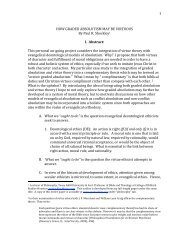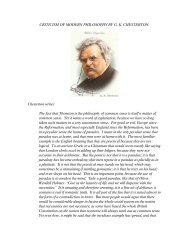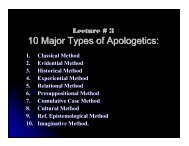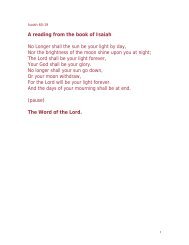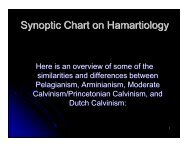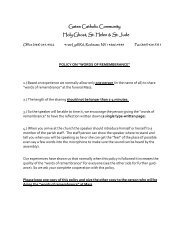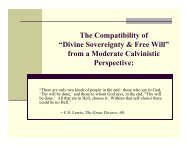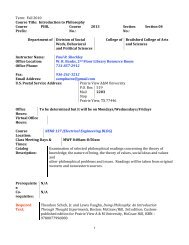REVELATION 4 9 11 Worthiness of God
REVELATION 4 9 11 Worthiness of God
REVELATION 4 9 11 Worthiness of God
Create successful ePaper yourself
Turn your PDF publications into a flip-book with our unique Google optimized e-Paper software.
THE WORTHINESS OF GOD:<br />
Revelation 4:9-<strong>11</strong><br />
Rev. Paul R. Shockley<br />
www.prshockley.org<br />
I. Introduction:<br />
Marshall Shelley tells the story that early in his marriage he gave his wife a terrific<br />
anniversary gift: a rain gauge. He writes, “At least I thought it was a great gift. Susan, after<br />
all, is a farmer’s daughter and keeps close watch on the weather. I envisioned her delight and<br />
nostalgia while tracking our backyard precipitation. I congratulated myself on my creativity.<br />
Guess what? Susan was not impressed: “A rain gauge- for our anniversary?!” The rain<br />
gauge is now a family joke, a classic example <strong>of</strong> a gift enjoyed by the giver but not the<br />
receiver.<br />
Ladies and Gentlemen: In the same way, when you are going about your daily lives in<br />
worship, what are you <strong>of</strong>fering Him? Do you <strong>of</strong>fer in your daily worship a gift you enjoy and<br />
figure <strong>God</strong> will like it to? We think our worship is so wonderful because we enjoyed it so<br />
much. But just like a thoughtful gift, real worship means knowing what is important to the<br />
Receiver.<br />
Tonight we are going to examine our worship to His worthiness.<br />
A. In terms <strong>of</strong> a recap so far in our study <strong>of</strong> Revelation 4:<br />
1. We began our study by examining John’s description <strong>of</strong> the One sitting on the Throne in<br />
verses 1-3. We recognized His position as our sovereign <strong>God</strong>, His power as almighty,<br />
and His person: one whose appearance is described in gem-like colors: brilliant like a<br />
Jasper diamond and blood red like a Sardius gemstone, and whose throne is encircled by<br />
a rainbow, emerald in appearance.<br />
2. Afterwards, we directed our attention to verses 4-<strong>11</strong> were we have learned certain truths<br />
about those who surround <strong>God</strong> in this future heavenly vision:<br />
a. First, the 24 elders and the four living creatures continuously worship <strong>God</strong>. They<br />
do not cease. They know their purpose.<br />
b. Their activity <strong>of</strong> worship is <strong>God</strong>-centered. No attention is drawn to them. There<br />
is no first person in their claims <strong>of</strong> worship. They know what really counts.<br />
c. We observed their location: they are in <strong>God</strong>’s presence. The 24 elders encircle<br />
the throne. They fall before Him. The four living creatures are in the midst and<br />
around the throne. If they are worshipping Him continuously, they<br />
never leave His presence. They know where to be.<br />
d. The content <strong>of</strong> their worship is most biblical: they continuously bring attention<br />
to <strong>God</strong> and His holiness, eternality, and worthiness. They know what to <strong>of</strong>fer<br />
Him.<br />
1
e. Note the disposition <strong>of</strong> the 24 elders: They fall down and they cast their crowns.<br />
Whether these crowns are crowns <strong>of</strong> rewards or rulership, what is<br />
absolutely clear is that they know who their <strong>God</strong> is and what to <strong>of</strong>fer Him.<br />
f. I also said chapter 4 also gives us a central truth about Him in view <strong>of</strong> the beings<br />
that surround Him?<br />
All they do is reflect who He is for He alone is worthy <strong>of</strong> their worship. Ever in<br />
His presence they glorify the One sitting on the throne. Do we?<br />
3. Then the last time we met we examined the first expression <strong>of</strong> praise which was given by<br />
the Four Living Creatures. Here they proclaimed His holiness, His omnipotence, and His<br />
eternality in Rev. 4:8. We then drew applications from the command 1 Peter 1:1:15-16<br />
on growing in holiness in our every day lives.<br />
: a. Cultivate the desire to be a holy man or woman <strong>of</strong> <strong>God</strong>;<br />
b. In your daily decision-making or moment-by-moment decisions you make, seek<br />
to think as <strong>God</strong> thinks and will as <strong>God</strong> wills;<br />
c. Be resolved never to do anything which you would be afraid to do if it were the<br />
last hour <strong>of</strong> your life;<br />
d. Develop an intimacy with <strong>God</strong> with utmost reverence in mind;<br />
e. Never tolerate activities that are not in keeping with our holy, loving <strong>God</strong>;<br />
f. Remember that authentic holiness points people to Jesus Christ.<br />
This evening we are going to explore the second expression <strong>of</strong> worship which we find in<br />
Revelation 4:9-<strong>11</strong>. Afterwards, we will ask ourselves how to respond to this revelation <strong>of</strong><br />
praise.<br />
II. EXPOSITION 4:9-<strong>11</strong>:<br />
9 Whenever the living creatures give glory and honor and thanks to Him who sits on the<br />
throne, who lives forever and ever, 10 the twenty-four elders fall down before Him who sits<br />
on the throne and worship Him who lives forever and ever, and cast their crowns before the<br />
throne, saying:<br />
<strong>11</strong><br />
“You are worthy, O Lord,<br />
To receive glory and honor and power;<br />
For You created all things,<br />
And by your will they exist and were created.”<br />
If I could summarize this expression <strong>of</strong> worship in one statement I would say:<br />
This tribute <strong>of</strong> praise declares <strong>God</strong> is worthy<br />
to receive power, honor, and glory because He is the Creator and the Sustainer.<br />
2
Let’s take a closer look at our passage for the evening.<br />
1. The doxology or praise in verse 8, “Holy holy, holy, Lord <strong>God</strong> Almighty, Who and is<br />
and is to come” is explained as giving <strong>God</strong> “glory, honor, and thanksgiving” in verse<br />
9.<br />
2. The word “give” should not be understood in the sense <strong>of</strong> imparting to <strong>God</strong> qualities<br />
that He does not already possess. These are characteristics inherent in Him. 1<br />
3. In response to the worship by the Four Living Creatures, the 24 elders <strong>of</strong>fer<br />
a four-fold response:<br />
a. First, they fall (pasountai) down before the One sitting on the throne who<br />
exercises all power, rule, and dominion.<br />
1. Whenever the Living Creatures give glory…the elders fall.<br />
To fall down is a proper response to the majesty <strong>of</strong> <strong>God</strong>: to worship is<br />
appropriate for his eternal being.<br />
“It is certainly possible to picture the praise <strong>of</strong> the living creatures and<br />
the response <strong>of</strong> the elders as taking place at repeated intervals <strong>of</strong> great<br />
significance throughout Revelation.” 2<br />
2. They prostrate themselves in worship before the one who is eternal.<br />
2. Here they alone fall before <strong>God</strong> who sits upon the throne.<br />
3. Interestingly, this is the first <strong>of</strong> six times in the Book <strong>of</strong> Revelation that<br />
the elders prostrate themselves before <strong>God</strong> or the Lamb (5:8, 14; 7:<strong>11</strong>;<br />
<strong>11</strong>:16; 19:4). Three times they are joined by the four living creatures<br />
(5:8; 7:<strong>11</strong>; 19:4) and once by all the angels (7:<strong>11</strong>). 3<br />
For example listen to the words in Revelation 7:9-12:<br />
9 After these things I looked, and behold, a great multitude which no one<br />
could number, <strong>of</strong> all nations, tribes, peoples, and tongues, standing before<br />
the throne and before the Lamb, clothed with white robes, with palm<br />
branches in their hands, and 10 and crying out with a loud voice saying,<br />
‘Salvation belongs to our <strong>God</strong> who sits on the throne and to the Lamb!’<br />
<strong>11</strong> All the angels stood around the throne and the elders and the four<br />
living creatures, and fell on their faces before the throne and worshiped<br />
<strong>God</strong> 12 saying:<br />
1 Robert Thomas, Revelation, 364.<br />
2 R. Mounce, The Book <strong>of</strong> Revelation, 126.<br />
3 Thomas, Revelation, 365.<br />
3
Amen! Blessing and glory and wisdom. Thanksgiving and honor and<br />
power and might, be to our <strong>God</strong> forever and ever.”<br />
3. Thus, they fall before <strong>God</strong> who sits on the throne. They engage<br />
every aspect <strong>of</strong> their being in their worship to Him. What a display<br />
<strong>of</strong> humility as they direct their undivided adoration to the eternal <strong>God</strong>.<br />
c. Second, they worship Him. The word “worship” originally involved the idea <strong>of</strong><br />
prostrating oneself before deity to kiss his feet or the hem <strong>of</strong> his garment. As an<br />
act <strong>of</strong> reverence and respect it was not uncommon in the East. Just as vassal<br />
kings removed their crowns when coming into the presence <strong>of</strong> their emperor,<br />
these kings lay their crowns before <strong>God</strong>. 4<br />
I would define worship here in this passage as “worthship.”<br />
d. Third, they cast their crowns before Him. They give no indication <strong>of</strong><br />
selfishness. Rather, they voluntarily surrender by casting their crowns before<br />
throne. What a demonstration that all glory belongs to Him.<br />
Lenski makes an interesting comment regarding the One sitting on the throne:<br />
“He wears no crown, for no mission <strong>of</strong> victory, no act <strong>of</strong> victorious<br />
enthronement, no triumph pertains to Him whose majesty as the Creator<br />
places him and his throne above and beyond anything <strong>of</strong> this kind.” 5<br />
e. And fourth, they worship Him by saying:<br />
“You are worthy, O Lord,<br />
To receive glory and honor and power;<br />
For You created all things,<br />
And by your will they exist and were created.”<br />
4. You are worthy, O Lord<br />
To receive glory and honor and power;<br />
A. The praise <strong>of</strong> the elders differs from that <strong>of</strong> the living creatures in two ways:<br />
1. The praise <strong>of</strong> the elders is addressed directly to <strong>God</strong>;<br />
2. The praise <strong>of</strong> the elders is based on his work in creation rather than his divine<br />
perfections.<br />
B. The word “worthy” [ axios /ax·ee·os/] is an adjective that carries the idea <strong>of</strong> (1)<br />
weighing, having weight, having the weight <strong>of</strong> another thing <strong>of</strong> like value, worth as<br />
4 Mounce, The Book <strong>of</strong> Revelation, 126.<br />
5 Lenski, Interpretation <strong>of</strong> Revelation, 188.<br />
4
much; (2) befitting, congruous, corresponding to a thing; (3) <strong>of</strong> one who has merited<br />
anything worthy, whether in good and a bad sense. 6<br />
C. Interestingly, the phrase, “you are worthy” was used in the political language <strong>of</strong> the day<br />
on such occasions as when the emperor marched in triumphal procession. In the<br />
ultimate sense, however, to attribute worthiness to anyone else than the one upon the<br />
throne is blasphemous (Mounce).<br />
D. The words, “glory”, “honor”, and “power” focuses upon <strong>God</strong>’s creative power. As<br />
the song <strong>of</strong> the living beings in 4:8 has for its theme the holiness, omnipotence, and<br />
eternality <strong>of</strong> <strong>God</strong>, aspects <strong>of</strong> his infinite-person, this verse revolves about the theme <strong>of</strong><br />
<strong>God</strong>’s glory as reflected in his creation.<br />
This leads us to the next statement:<br />
5. “For you created all things, and by your will they exist and were created.”<br />
A. He is worthy because in accordance with his will all things “were created and have<br />
their being.” We might re-translate it and say, “they were and they were created.” “This<br />
suggests that all things that are, existed first in the eternal will <strong>of</strong> <strong>God</strong> and through his<br />
will came into actual being at his appointed time.” 7 Moreover, “The song accumulates<br />
emphasis on <strong>God</strong>’s creative work through this threefold statement that he did it.” 8<br />
B. The particular reason for the declaration <strong>of</strong> <strong>God</strong>’s worthiness is because <strong>of</strong> <strong>God</strong>’s creative<br />
work. Whereas the first expression <strong>of</strong>fered by the 4 living creatures praised <strong>God</strong> for his<br />
holiness, the 24 elders praise him for his worthiness. He is worthy to receive such<br />
adulation because he sovereignly created everything that exists and by his will allows<br />
them to continue to exist.<br />
C. This reminds me <strong>of</strong> <strong>God</strong>’s first speech to Job when <strong>God</strong> finally breaks his silence<br />
and speaks to Job, rhetorically asking him more than 70 questions to show Job’s<br />
ignorance and <strong>God</strong>’s greatness in Job 38. Listen to Job 38:4-7:<br />
“Where were you when I laid the foundation <strong>of</strong> the earth? Tell Me, if you have<br />
understanding, 5 who sets is measurements? Since you know. Or who stretched the line<br />
on it? 6 On what were its bases sunk? Or who laid its cornerstone. 7 When the morning<br />
stars sang together And all the sons <strong>of</strong> <strong>God</strong> shouted for joy?”<br />
D. Such an acknowledgement <strong>of</strong> <strong>God</strong>’s creative work recalls the following:<br />
1. Psalm 33:6-9:<br />
By the word <strong>of</strong> the LORD the heavens were made,<br />
And all the host <strong>of</strong> them by the breath <strong>of</strong> His mouth.<br />
6 Strong, James: The Exhaustive Concordance <strong>of</strong> the Bible : Showing Every Word <strong>of</strong> the Test <strong>of</strong> the<br />
Common English Version <strong>of</strong> the Canonical Books, and Every Occurrence <strong>of</strong> Each Word in Regular Order.<br />
electronic ed. Ontario : Woodside Bible Fellowship., 1996, S. G514<br />
7 Mounce, The Book <strong>of</strong> Revelation, 127.<br />
8 Thomas, Revelation, 368.<br />
5
7 He gathers the waters <strong>of</strong> the sea together as a heap;<br />
He lays up the deep in storehouses.<br />
8 Let all the earth fear the LORD;<br />
Let all the inhabitants <strong>of</strong> the world stand in awe <strong>of</strong> Him.<br />
9 For He spoke, and it was done;<br />
He commanded, and it stood fast.<br />
2. Psalm 102:25:<br />
Of old You laid the foundation <strong>of</strong> the earth,<br />
And the heavens are the work <strong>of</strong> Your hands 9<br />
3. Another passage is Psalm 136:5-9:<br />
E. Before we move onto the application aspect <strong>of</strong> our study, let me just say I find this<br />
statement <strong>of</strong> praise (and statements like these) so comforting, don’t you?<br />
1. <strong>God</strong>, the author <strong>of</strong> all things exist and continue to exist; we are his handiwork, and we<br />
continue to exist even in spite <strong>of</strong> our sin. Consider the words <strong>of</strong> J. I. Packer in his<br />
classic work, Knowing <strong>God</strong>:<br />
“What matters supremely, therefore, is not, in the last analysis, the fact that I know <strong>God</strong>, but<br />
the larger fact which underlies it-that He knows me. I am graven on the palms <strong>of</strong> His hands.<br />
I am never out <strong>of</strong> His mind. All my knowledge <strong>of</strong> Him depends on His sustained initiative in<br />
knowing me. I know Him because he first knew me, and continues to know me. He knows me<br />
as a friend, one who loves me; and there is no moment when His eye is <strong>of</strong>f me, or His<br />
attention distracted from me, and no moment, therefore, when His care falters. This is<br />
momentous knowledge. There is unspeakable comfort… in knowing that <strong>God</strong> is constantly<br />
taking knowledge <strong>of</strong> me in love and watching over me for my good. There is tremendous<br />
relief in knowing that His love is utterly realistic, based at every point on prior knowledge <strong>of</strong><br />
the worst about me, so that no discovery now can disillusion Him about me, in the way I am<br />
so <strong>of</strong>ten disillusioned about myself, and quench His determination to bless me.”<br />
III. How should we respond to this revelation?<br />
A. If worthiness is giving what is due <strong>God</strong>, what are you <strong>of</strong>fering Him in daily worship? Are<br />
you giving <strong>God</strong> a water gauge? Do you <strong>of</strong>fer him what you enjoy and figure <strong>God</strong> will<br />
like it? Once again, like a thoughtful gift, real worship means knowing what’s important<br />
to the receiver.<br />
1. What do you <strong>of</strong>fer Him in your worship? Does that truly express His worthiness?<br />
2. When do you <strong>of</strong>fer such worship? Does that truly express His worthiness?<br />
3. Why do you even <strong>of</strong>fer worship?<br />
B. Yesterday I listened to the story <strong>of</strong> a pastor who went to minister in Africa. After being<br />
there for a while he turned to <strong>God</strong> in prayer-absolutely angry at Him. He said I came to<br />
preach the Good News <strong>of</strong> Salvation, to see these dear children be spared from the fury <strong>of</strong><br />
hell and damnation. But it turns out that they aren’t ignorant <strong>of</strong> your presence. Rather,<br />
they refuse to acknowledge your presence. Why? Why would you send me here to be in<br />
9 The New King James Version. Nashville : Thomas Nelson, 1982, S. Ps 102:25<br />
6
the company <strong>of</strong> rebellious savages who know you exist but refuse to bow to you? In that<br />
moment <strong>of</strong> prayer he came to horrible realization: “To show you, preacher and pastor,<br />
that you are robbing me <strong>of</strong> my glory.” See, this pastor went to Africa for his own sake,<br />
maybe for the sake <strong>of</strong> others, but not for the glory <strong>of</strong> <strong>God</strong>.<br />
C. Who do we think we are kidding? When we are not <strong>of</strong>fering him our utmost best,<br />
<strong>of</strong>fering <strong>God</strong> the worthiness that is due Him, we are actually saying to Him, “<strong>God</strong> you are<br />
not worthy enough to receive my utmost.” We know from the story <strong>of</strong> Cain and Abel<br />
that <strong>God</strong> doesn’t like acts <strong>of</strong> selfish worship cloaked in unselfish appearances.<br />
But then the question comes: How can we <strong>of</strong>fer Him our very best? Surely, because <strong>of</strong><br />
the residual effects <strong>of</strong> our sin nature, every act we do is tainted in some way with selfish<br />
motives or intentions.<br />
On the surface, that seems right. (a) We are very selfish creatures. (b) There is this<br />
warring within, there is this old man, and (c) there are thousands <strong>of</strong> past experiences in<br />
our own lives to which we can appeal to demonstrate that though our actions appeared to<br />
be <strong>God</strong>-honoring, but if the truth be fully known, our motives were indeed selfish.<br />
D. If it is inevitable that at the core <strong>of</strong> every action is a selfish motive, even in those acts that<br />
appear to be most noble, then I don’t see how any “reward” will survive the exposing fire<br />
at the judgment seat <strong>of</strong> Christ. Consider the words <strong>of</strong> 1 Corinthians 3:10-15:<br />
1 Corinthians 3:10-15:<br />
10 According to the grace <strong>of</strong> <strong>God</strong> which was given to me, as a wise master builder<br />
I have laid the foundation, and another builds on it. But let each one take heed<br />
how he builds on it. <strong>11</strong> For no other foundation can anyone lay than that which is<br />
laid, which is Jesus Christ. 12 Now if anyone builds on this foundation with gold,<br />
silver, precious stones, wood, hay, straw, 13 each one’s work will become clear;<br />
for the Day will declare it, because it will be revealed by fire; and the fire will<br />
test each one’s work, <strong>of</strong> what sort it is. 14 If anyone’s work which he has built on<br />
it endures, he will receive a reward. 15 If anyone’s work is burned, he will suffer<br />
loss; but he himself will be saved, yet so as through fire. 10<br />
Every selfish act will be wood, stubble, & hay.<br />
E. Thus, while I am not advocating perfectionism, I do believe it is possible to <strong>of</strong>fer our very<br />
best to Him with <strong>God</strong>-honoring motives, when we are controlled by the Holy Spirit,<br />
walking dependently, step-by-step in His strength, bearing the fruit <strong>of</strong> the Spirit.<br />
F. Having said it is possible to <strong>of</strong>fer Him our very best because <strong>of</strong> the Holy Spirit’s ministry<br />
(s) in our lives when we “abide” in fellowship with our living <strong>God</strong>, let’s look again at the<br />
passage, and I want you to notice two qualities <strong>of</strong> worship that are expressed in this<br />
praise:<br />
1. Humility and submission.<br />
10 The New King James Version. Nashville : Thomas Nelson, 1982, S. 1 Co 3:10-15<br />
7
a. When these high orders [24 elders] sing their praises to the One sitting<br />
on the throne, they fall before him and relinquish all their honor to him.<br />
1. When they fall down, they <strong>of</strong>fer humility. They aren’t clinging<br />
to their own bit <strong>of</strong> honor. Nothing is reserved for them;<br />
nothing is held back.<br />
2. When they cast their crowns, they <strong>of</strong>fer submission. They aren’t<br />
clinging to even one “smidgen” <strong>of</strong> power, no matter how well<br />
deserved it may be. All they have that is worthy <strong>of</strong> selfrecognition<br />
is laid before the throne <strong>of</strong> <strong>God</strong>.<br />
b. To be sure, the positions they occupy and the authority or rewards they<br />
have are indeed blessings. They are privileged, blessed to occupy these<br />
thrones that encircles <strong>God</strong>’s throne and to wear crowns <strong>of</strong> rulership or<br />
rewards. But, in their worship <strong>of</strong> <strong>God</strong>, do you see them clinging to their<br />
own bit <strong>of</strong> honor and power, no matter how well deserved it may be? <strong>11</strong><br />
1. Do you see any reservation as they worship him? No, as<br />
they prostrate themselves we see every ounce <strong>of</strong> energy<br />
is directed to <strong>God</strong>.<br />
They are <strong>of</strong>fering Him their utmost.<br />
2. Are they distracted in any way in their worship? Are<br />
they looking back at John as they worship him? Not one<br />
<strong>of</strong> them said, “I can’t worship right now because John is<br />
here. . I don’t see them asking in their praise to<br />
<strong>God</strong>, “You know, I wonder what this John is up to?<br />
I don’t see them saying, “The four living creatures with<br />
all their eyes around and within are giving me the creeps<br />
They are focused.<br />
3. Do you see any embarrassment in their worship? Do<br />
they even care who sees them? They don’t<br />
think it is embarrassing to drop to their knees and bow<br />
their face to the floor.<br />
Rather than be self-conscious, they know who they are<br />
worshipping.<br />
4. Do you see any bit <strong>of</strong> selfish motive? Is there<br />
anything here that says, “what about me? Are they<br />
seeking to gain any bit <strong>of</strong> the glory, to fulfill their<br />
personal needs and wishes?<br />
No, their worship <strong>of</strong> <strong>God</strong> is their identity.<br />
<strong>11</strong> Allen P. Ross, Recalling the Hope <strong>of</strong> Glory, 483.<br />
8
Is yours?<br />
G. If anything less than my very best is what expresses His worthiness, then what are steps I<br />
can take to <strong>of</strong>fer my utmost in worship? In answering this question I am going to start<br />
with are affections, consider our appetites, then our thinking, and lastly, our<br />
surroundings. By approaching this holistically, we may better address this subject.<br />
Beginning with our affections (the desires <strong>of</strong> our heart):<br />
1. Pray to <strong>God</strong> every day that you will whole heartily seek to honor His name.<br />
Just as Jesus prayed in Matthew 6:9, “Pray then like this, ‘Our Father in heaven,<br />
hallowed be your name. To see <strong>God</strong>’s name honored should be the greatest joy<br />
<strong>of</strong> all who love <strong>God</strong>.<br />
2. Pray to <strong>God</strong> every day that you will authentically find joy in worshipping<br />
Him.<br />
Do you realize time and time again the psalmists links the joy we have in <strong>God</strong><br />
with the praise we bring his name. Consider Psalm 9:2, “I will be glad and exult<br />
in you; I will sing praise to your name, O most High”<br />
3. Pray to <strong>God</strong> every day that He will bind your heart to Himself. Is that not<br />
what we ask <strong>God</strong> to do when we sing “Come, Thou Fount <strong>of</strong> Every Blessing” by<br />
Robert Robinson?<br />
One <strong>of</strong> the reasons why I’ve come to enjoy this hymn so much is because I am<br />
acknowledging <strong>God</strong>’s absolute right to bind my heart to Himself: 12<br />
“O to grace how great a debtor, Daily<br />
I am constrained to be!<br />
Let thy goodness, like a fetter,<br />
Bind my wandering heart to Thee.<br />
Prone to wander, Lord, I feel it,<br />
Prone to leave the <strong>God</strong> I love;<br />
Here’s my heart, O take and seal it,<br />
Seal it for Thy courts above.”<br />
Let Thy goodness, like a fetter, bind my wandering heart to Thee. A “fetter” is<br />
chain. We need to pray this with all our wandering heart, “Grant us, O <strong>God</strong>, to<br />
see the surpassing value <strong>of</strong> your goodness so that it binds us, as with a chain, to<br />
you. I <strong>of</strong>fer you my heart…take and seal it, for your courts above.” 13<br />
4. Regularly examine the desires <strong>of</strong> your heart and see whether they<br />
express the worthiness that is due Him. Activities tend to follow the desires <strong>of</strong><br />
your heart. Let me put it this way, “What do you want out <strong>of</strong> life?” Does what<br />
you want reflect the worship that is due Him with the remaining breath you<br />
have.<br />
12 John Piper, When I Don’t Desire <strong>God</strong>: How to Fight for Joy, 152.<br />
13 Ibid.<br />
9
Like Dr. Ken Hanna states:<br />
“We can’t expect worship to flow from our lips on the Lord’s Day if we keep it<br />
dammed in our hearts throughout the week. The waters <strong>of</strong> worship should never<br />
stop flowing from our heart, for <strong>God</strong> is always <strong>God</strong> and always worthy <strong>of</strong><br />
worship. But the flow <strong>of</strong> worship should be channeled and distilled at least daily<br />
into a distinct worship experience.”<br />
Moving from our affections to our appetites:<br />
5. Quit nibbling at the table <strong>of</strong> the world.<br />
John Piper puts it this way:<br />
“If you don’t feel strong desires for the manifestation <strong>of</strong> the glory <strong>of</strong> <strong>God</strong>, it is<br />
not because you have drunk deeply and are satisfied. It is because you have<br />
nibbled so long at the table <strong>of</strong> the world. Your soul is stuffed with small things,<br />
and there is no room for the great. <strong>God</strong> did not create you for this? There is an<br />
appetite for <strong>God</strong>. And it can be awakened. I invite you to turn from the dulling<br />
effects <strong>of</strong> food and the dangers <strong>of</strong> idolatry and to say with some simple fast:<br />
‘This much, O <strong>God</strong>, I want you.’” 14<br />
Using Old Testament ceremonial language Paul says, “Cleanse out the old leaven<br />
that you may be new lump, as you really are unleavened” (1 Cor. 5:7). In other<br />
words, you are sinless in Christ; therefore become sinless in practice.<br />
Moving from our appetites to our thinking:<br />
6. Meditate on <strong>God</strong>’s Instructions:<br />
8<br />
9<br />
10<br />
<strong>11</strong><br />
The law <strong>of</strong> the LORD is perfect, converting the soul;<br />
The testimony <strong>of</strong> the LORD is sure, making wise the simple;<br />
The statutes <strong>of</strong> the LORD are right, rejoicing the heart;<br />
The commandment <strong>of</strong> the LORD is pure, enlightening the eyes;<br />
The fear <strong>of</strong> the LORD is clean, enduring forever;<br />
The judgments <strong>of</strong> the LORD are true and righteous altogether.<br />
More to be desired are they than gold,<br />
Yea, than much fine gold;<br />
Sweeter also than honey and the honeycomb.<br />
Moreover by them Your servant is warned,<br />
And in keeping them there is great reward. 15<br />
Other passages: John :17:17; Romans 12:1-2; 1 Timothy 3:16-17.<br />
Moving from our thinking to our surroundings:<br />
14 Ibid., 172.<br />
15 The New King James Version. Nashville : Thomas Nelson, 1982, S. Ps 19:7-<strong>11</strong><br />
10
7. Give <strong>God</strong> your very best (Mark 14:3-8): There is really something beautiful<br />
when you give back to <strong>God</strong> what He has given to you. In that moment, when<br />
you give back the good and perfect gifts <strong>God</strong> has given you, He is<br />
worshipped…for you are willing to give up for the glory <strong>of</strong> <strong>God</strong>.<br />
Consider the anointing <strong>of</strong> Jesus by Mary in Mark 14:3-8:<br />
“3 While he was in Bethany at the home <strong>of</strong> Simon the leper, and reclining at<br />
the table, there came a woman with an alabaster vial <strong>of</strong> very costly perfume <strong>of</strong><br />
pure nard; and she broke the vial and poured it over His head. 4 But some<br />
were indignantly remarking to one another, “Why has this perfume been<br />
wasted? 5 For this perfume might have been sold for over three hundred<br />
denarii, and the money given to the poor.” And they were scolding her. 6 But<br />
Jesus said, “Let her alone; why do you bother her? She has a done a good deed<br />
to Me. 7 For you always have the poor with you, and whenever you wish you<br />
can do good to them; but you do not always have Me. 8 She has done what she<br />
could; she has anointed My body beforehand for the burial.”<br />
Though you may not be able to pour costly perfume on Jesus’ feet, in one sense<br />
you actually do when you sincerely love others, meeting the practical needs <strong>of</strong><br />
others, even if that means it will demand self-surrender.<br />
8. Determine what places, activities, and thoughts prompt you to worship.<br />
Incorporate those elements into your daily and weekly life. Devote quality time<br />
to them. Similarly, identify and avoid the things that hinder meaningful worship.<br />
We must not forget, however, that <strong>God</strong> expects us to worship privately …We minimize<br />
our joy when we neglect the daily worship <strong>of</strong> <strong>God</strong> in private. It is one <strong>of</strong> the great<br />
blessings <strong>of</strong> life that <strong>God</strong> does not limit our access to Him and enjoyment <strong>of</strong> His presence<br />
to one day per week! Daily strength, guidance, and encouragement are available to us.<br />
An invitation to grow in intimacy with Jesus Christ Himself is open every day. …To<br />
worship <strong>God</strong> throughout a lifetime requires discipline. Without discipline, our worship<br />
<strong>of</strong> <strong>God</strong> will be thin and inconsistent. When I say that worship is focusing on and<br />
responding to <strong>God</strong>, I hope to convey my conviction that true worship is always covered<br />
with heart prints. Worship can’t be diagramed or calculated, for it is the response <strong>of</strong> a<br />
heart in love with <strong>God</strong>. And yet, we also must be able to think <strong>of</strong> worship as a<br />
Discipline, a Discipline that must be cultivated just as all relationships must be to remain<br />
healthy and grow. 16<br />
9. Lastly, seek to see what few only take time to see: The glory <strong>of</strong> <strong>God</strong><br />
revealed in creation.<br />
Psalm 92:4 states “For you, O Lord, have made me glad by your work; at the<br />
works <strong>of</strong> your hands I sing for joy.” Psalm 19:1-4 puts it this way:<br />
“The heavens declare the glory <strong>of</strong> <strong>God</strong>, and the sky above proclaims his<br />
handiwork. Day to day pours out his speech and night to night reveals<br />
knowledge. There is no speech, nor are there words, whose voice is not heard.<br />
The measuring line goes out through the earth, and their words to the end <strong>of</strong> the<br />
world.”<br />
16 Donald S. Whitney, Spiritual Disciplines for the Christian life, p. 94.<br />
<strong>11</strong>
Do we really realize, in and through <strong>God</strong>’s creation, <strong>God</strong>’s creation reflects and<br />
even rests on the glory <strong>of</strong> Him.<br />
IV. Conclusion:<br />
In conclusion, I want to illustrate upon this last point by a sharing a story from C. S.<br />
Lewis’ <strong>God</strong> in the Dock.<br />
I was standing today in the dark tool shed. The sun was shining outside and through the<br />
crack at the top <strong>of</strong> the door there came a sun-beam. From where I stood that beam <strong>of</strong><br />
light, with the specks <strong>of</strong> dust floating in it, was the most striking thing in the place.<br />
Everything else was almost pitched-black. I was seeing the beam, not seeing things by it.<br />
Then I moved so that the beam fell on my eyes. Instantly the whole previous picture<br />
vanished. I saw no tool shed, and (above all) no beam. Instead, I saw, framed in the<br />
irregular cranny at the top <strong>of</strong> the door, green leaves moving on the branches <strong>of</strong> a tree<br />
outside and beyond that, 90 odd million miles away, the sun. Looking along the beam,<br />
and looking at the beam are very different experiences. 17<br />
See, here is a man who is able to see what few see. Ladies and gentlemen: every day<br />
take a moment, gaze upon some aspect <strong>of</strong> <strong>God</strong>’s creativity, and allow that display <strong>of</strong><br />
glory prompt you to worship Him, giving Him his due (cf. Prov. 29; the wisdom <strong>of</strong> four<br />
creatures).<br />
17 C. S. Lewis, “Meditation in a Tool shed” in <strong>God</strong> in the Dock, pg. 212.<br />
12



